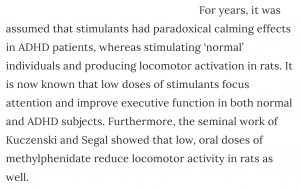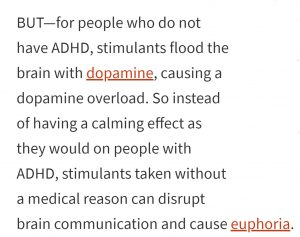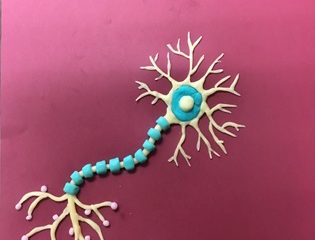I always cringe a bit when my Google alerts point to a newly published study that has a title something like “what textbooks get wrong about subject X.” Accuracy is obviously a top goal in the text writing business. But usually, upon reading the article, our books come out well or the issue is a bona fide area of disagreement in the field (as was the case in a recent article on how intelligence is covered in intro psych texts).
We also run into the occasional discrepancies between what we teach in one part of the field and what our colleagues are presenting. These are generally good teachable moments–science benefits from differences of opinion. But these situations do need some sensitivity. We don’t want our students to doubt our credibility or that of our colleagues.

Arnsten (2006) sets the record straight.
On rare occasions, though, we run into an outright error that must be corrected. A case in point is the long-lived myth of paradoxical responses to stimulant medication and ADHD. I have found that clinicians sometimes cling to the belief that if you have ADHD, stimulants will calm you, but if you do NOT have ADHD, you will become hyperactive. Arnsten (2006) did an excellent job of not only debunking this myth, but of giving us its history. Part of the misunderstanding came from comparisons required for ethical reasons between children with ADHD and rats. The doses of stimulant originally given to the rats were very high, so not too surprisingly, they became more active. When doses similar to those used to treat ADHD were given, the rats actually calmed down, just like the children.
It is true that the magnitude of response might be slightly different between people who do and do not have ADHD due to ceiling effects, but the direction of the drug’s effect is identical. It actually would be useful if people with ADHD responded differently to stimulants, as this would help clinicians make more accurate diagnoses.
When this issue came up in a recent Behavioral Neuroscience class, I offered extra credit to my students for finding evidence related to the supposed paradox. Those who participated did a fantastic job! Kudos to all! I was especially amazed by a find by Maya P., who found a NIDA for Teens page that repeated the myth. We certainly want a government information site to be accurate. Needless to say, I commented on the page in hopes that they fix it. Hopefully, they stop publishing under the pen name Sara Bellum (ugh) as well.

NIDA for Teens is still buying the myth.
To be fair, neuroscience today is so broad that nobody should pretend to be a “know it all.” Keeping up with all the new data is a full-time job in itself. Add to that the challenges of small n studies and failures to replicate, and we all need to be kind to ourselves. We continue to strive to present the most accurate information possible, and we must be open-minded when others challenge what we’re teaching.



0 Comments